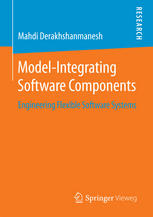

Most ebook files are in PDF format, so you can easily read them using various software such as Foxit Reader or directly on the Google Chrome browser.
Some ebook files are released by publishers in other formats such as .awz, .mobi, .epub, .fb2, etc. You may need to install specific software to read these formats on mobile/PC, such as Calibre.
Please read the tutorial at this link: https://ebookbell.com/faq
We offer FREE conversion to the popular formats you request; however, this may take some time. Therefore, right after payment, please email us, and we will try to provide the service as quickly as possible.
For some exceptional file formats or broken links (if any), please refrain from opening any disputes. Instead, email us first, and we will try to assist within a maximum of 6 hours.
EbookBell Team

5.0
20 reviewsIn his study, Mahdi Derakhshanmanesh builds on the state of the art in modeling by proposing to integrate models into running software on the component-level without translating them to code. Such so-called model-integrating software exploits all advantages of models: models implicitly support a good separation of concerns, they are self-documenting and thus improve understandability and maintainability and in contrast to model-driven approaches there is no synchronization problem anymore between the models and the code generated from them. Using model-integrating components, software will be easier to build and easier to evolve by just modifying the respective model in an editor. Furthermore, software may also adapt itself at runtime by transforming its own model part.